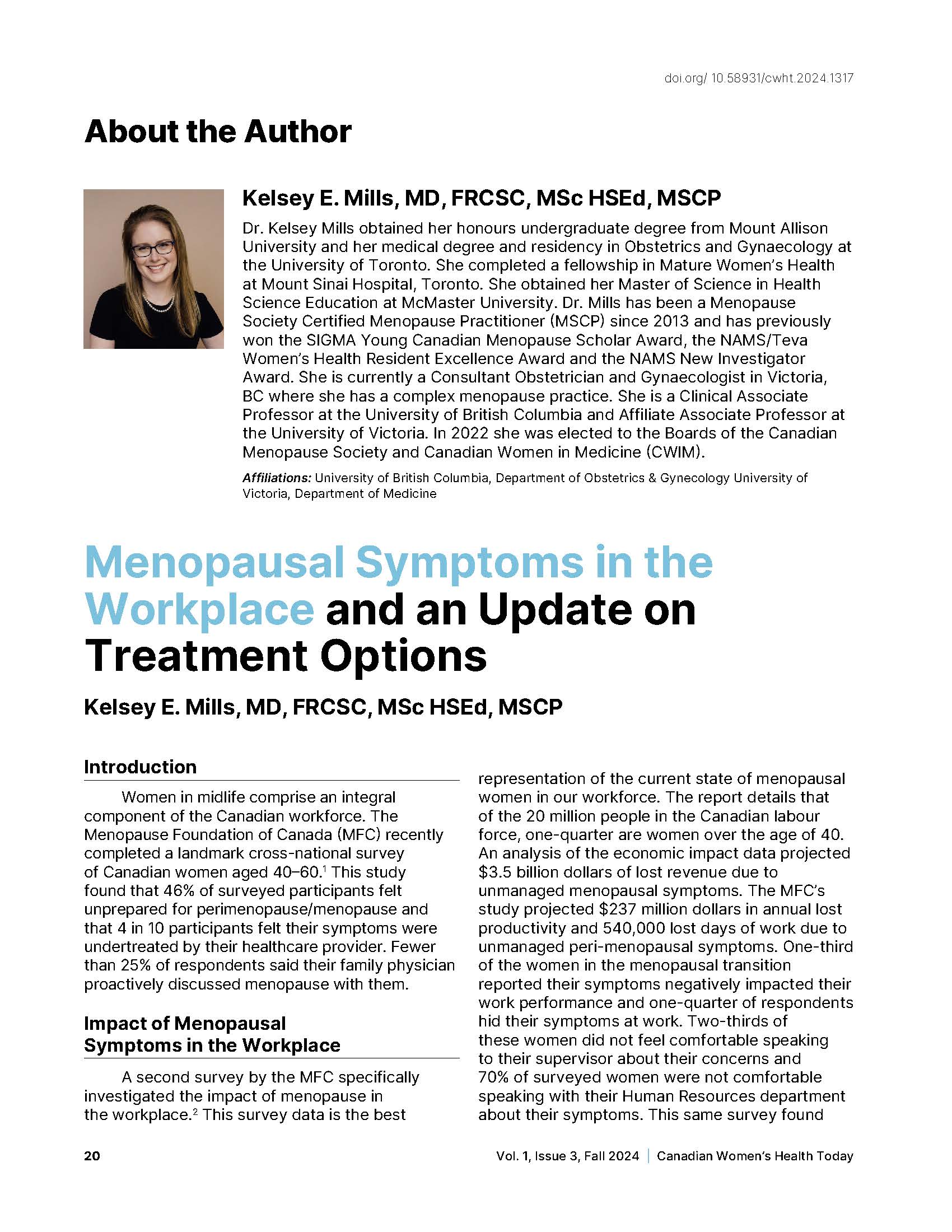Menopausal Symptoms in the Workplace and an Update on Treatment Options
DOI:
https://doi.org/10.58931/cwht.2024.1317Abstract
Women in midlife comprise an integral component of the Canadian workforce. The Menopause Foundation of Canada (MFC) recently completed a landmark cross-national survey of Canadian women aged 40–60. This study found that 46% of surveyed participants felt unprepared for perimenopause/menopause and that 4 in 10 participants felt their symptoms were undertreated by their healthcare provider. Fewer than 25% of respondents said their family physician proactively discussed menopause with them.
References
Menopause Foundation of Canada. The Silence and the Stigma: Menopause in Canada (a cross-national Leger survey). 2022.
The Menopause Foundation of Canada. Menopause and Work in Canada. 2023.
Yuksel N, Evaniuk D, Huang L, et al. Guideline No. 422a: Menopause: Vasomotor Symptoms, Prescription Therapeutic Agents, Complementary and Alternative Medicine, Nutrition, and Lifestyle. J Obstet Gynaecol Can. 2021 Oct;43(10):1188-1204.e1.
The 2022 hormone therapy position statement of The North American Menopause Society. Menopause. 2022 Jul;29(7):767-94.
Avis NE, Crawford SL, Greendale G, et al. Duration of menopausal vasomotor symptoms over the menopause transition. JAMA Intern Med. 2015 Apr 1;175(4):531.
Shufelt C, Manson J. Managing menopause by combining evidence with clinical judgment. Clin Obstet Gynecol. 2018 Sep;61(3):470-9.
Singletary SE. Rating the risk factors for breast cancer. Ann Surg. 2003 Apr;237(4):474-82.
Writing Group For The Women’s Health Initiative Investigators. Risks and benefits of estrogen plus progestin in healthy postmenopausal women: principal results from the Women’s Health Initiative Randomized Controlled Trial. JAMA. 2002 Jul 17;288(3):321-33.
Hoffman SR, Governor S, Daniels K, et al. Comparative safety of conjugated estrogens/bazedoxifene versus estrogen/progestin combination hormone therapy among women in the United States: a multidatabase cohort study. Menopause. 2023 Aug;30(8):824-30.
Formoso G, Perrone E, Maltoni S, et al. Short-term and long-term effects of tibolone in postmenopausal women. Cochrane Gynaecology and Fertility Group, editor. Cochrane Database Syst Rev [Internet]. 2016 Oct 12;10(10):CD008536.
Johnston S, Bouchard C, Fortier M, et al. Guideline No. 422b: Menopause and Genitourinary Health. J Obstet Gynaecol Can. 2021 Nov;43(11):1301-07.e1.
The 2020 genitourinary syndrome of menopause position statement of The North American Menopause Society. Menopause. 2020 Sep;27(9):976-92.
The 2023 nonhormone therapy position statement of The North American Menopause Society. Menopause. 2023 Jun;30(6):573-90.
Lederman S, Ottery FD, Cano A, et al. Fezolinetant for treatment of moderate-to-severe vasomotor symptoms associated with menopause (SKYLIGHT 1): a phase 3 randomised controlled study. The Lancet. 2023 Apr;401(10382):1091-102.
Simon JA, Anderson RA, Ballantyne E, et al. Efficacy and safety of elinzanetant, a selective neurokinin-1,3 receptor antagonist for vasomotor symptoms: a dose-finding clinical trial (SWITCH-1). Menopause. 2023 Mar;30(3):239-46.
Goldstein S. An efficient tool for the primary care management of menopause. Can Fam Physician Med Fam Can. 2017 Apr;63(4):295-8.
Manson JE, Ames JM, Shapiro M, et al. Algorithm and mobile app for menopausal symptom management and hormonal/non-hormonal therapy decision making: a clinical decision-support tool from The North American Menopause Society. Menopause. 2015 Mar;22(3):247-53.

